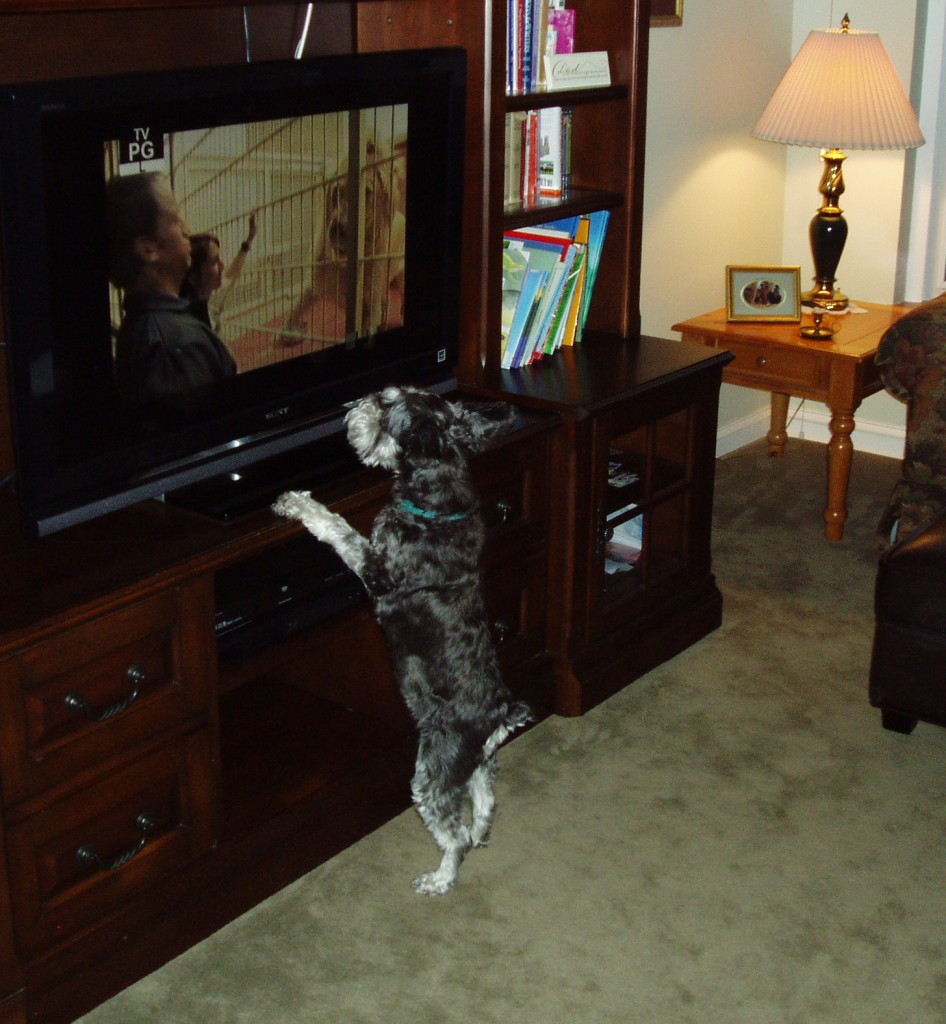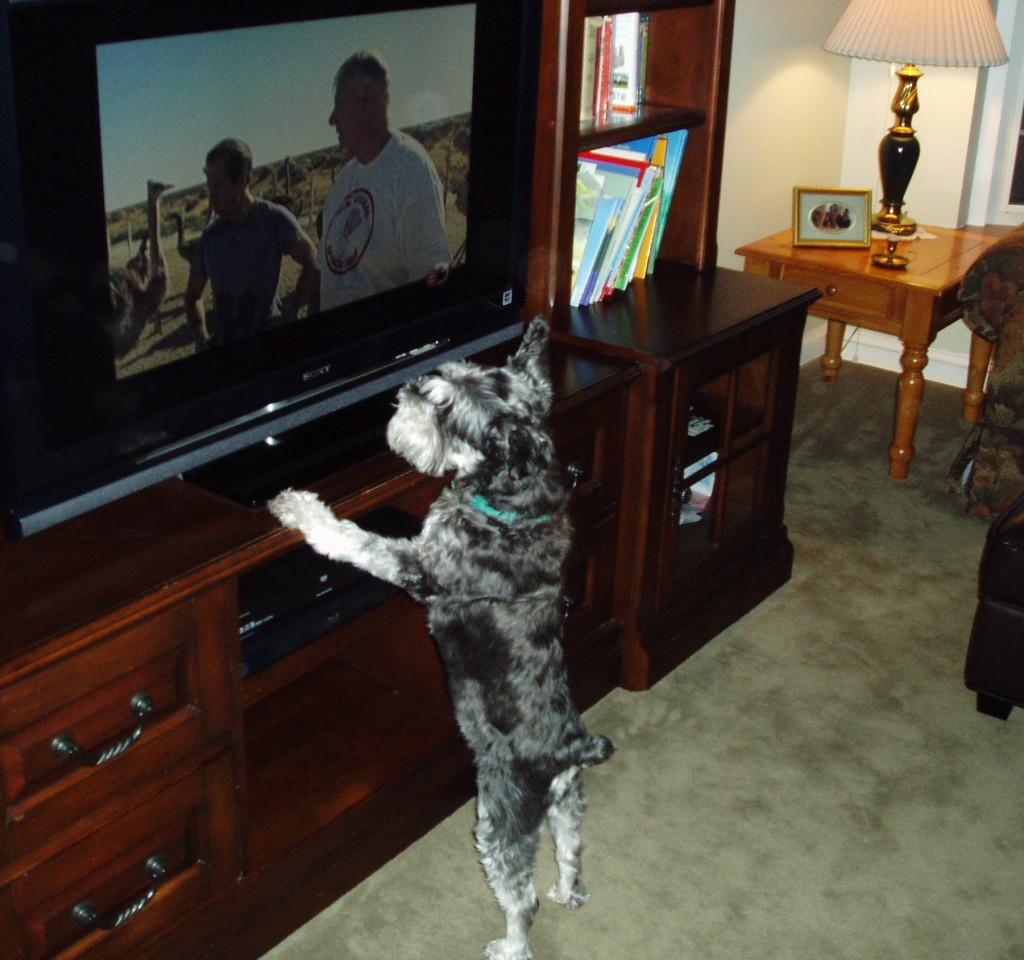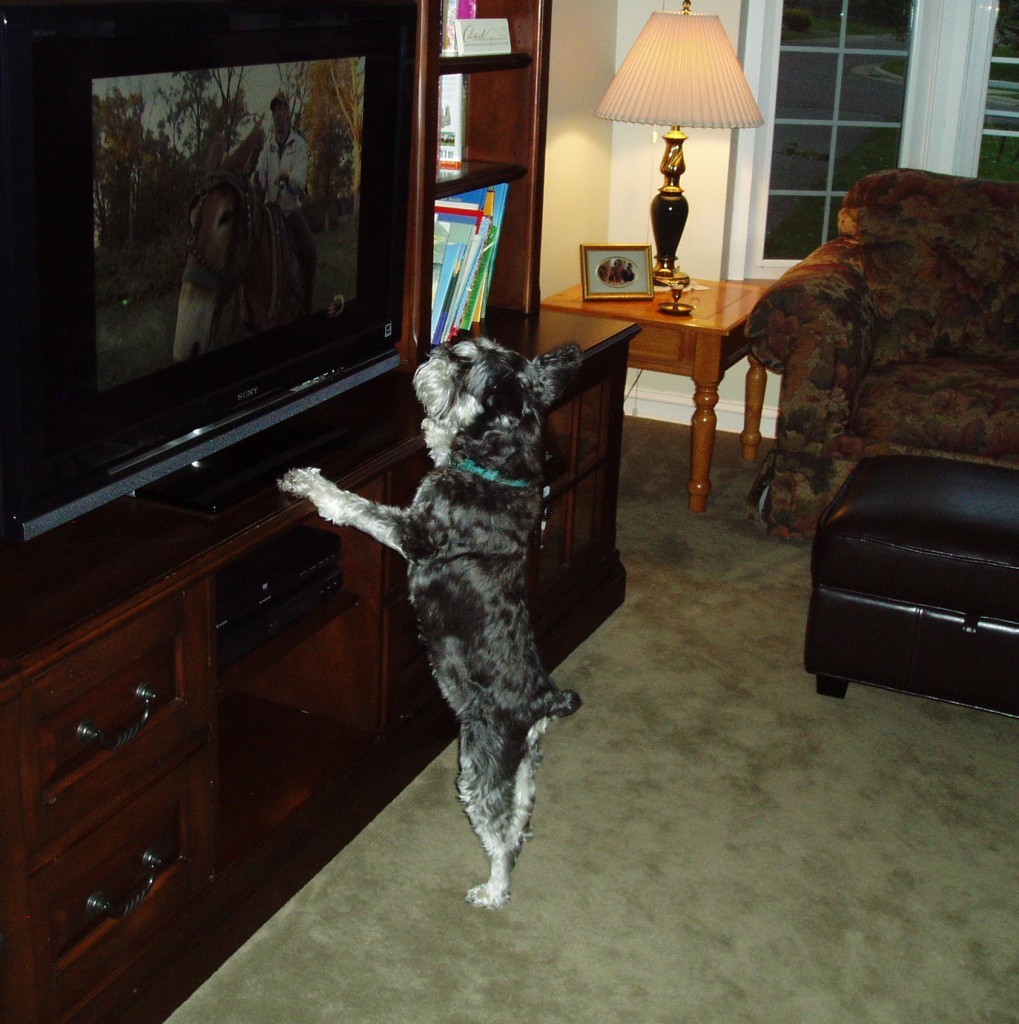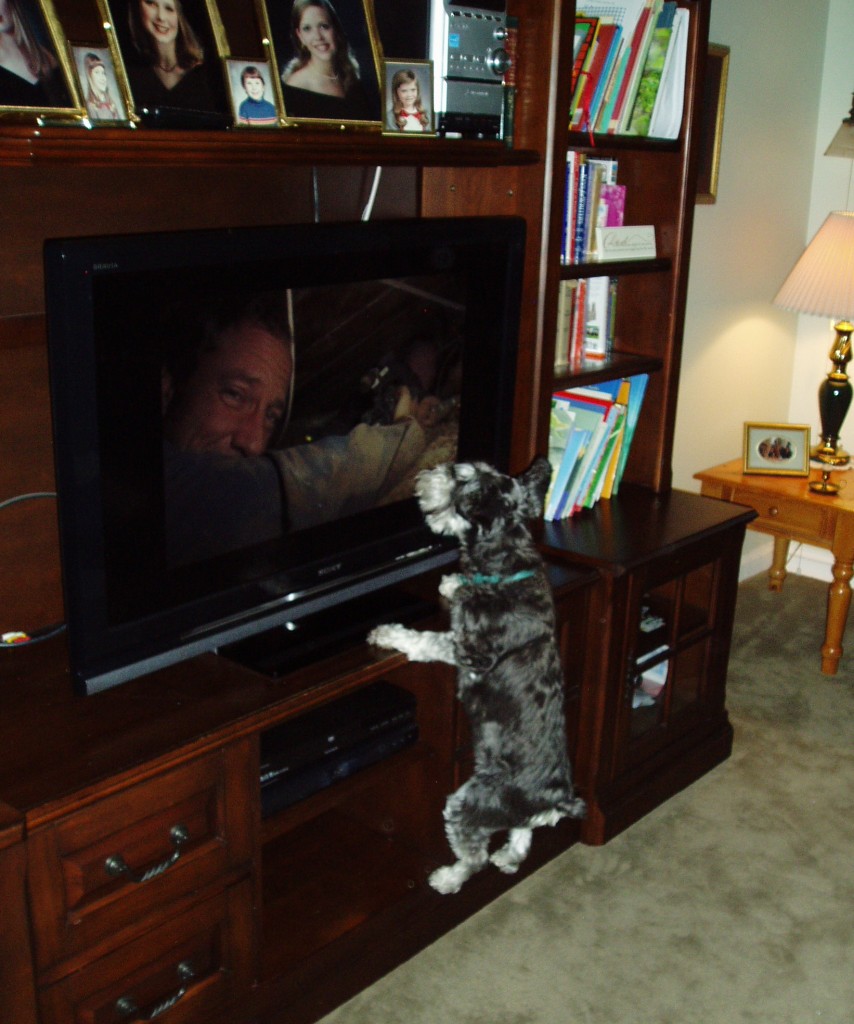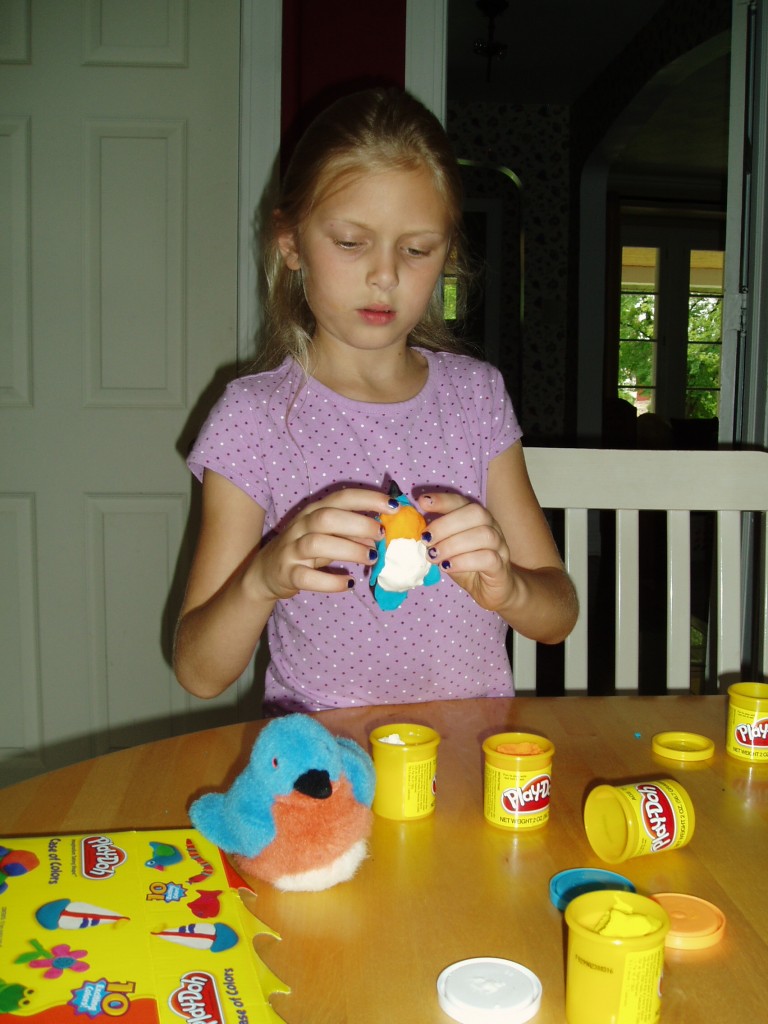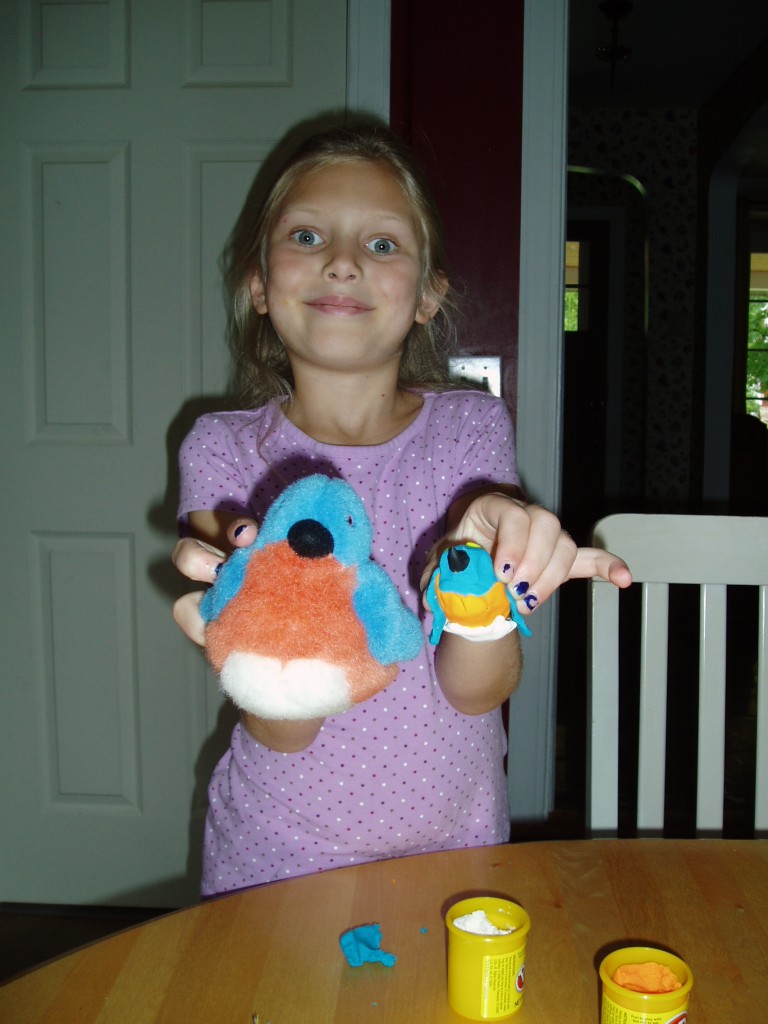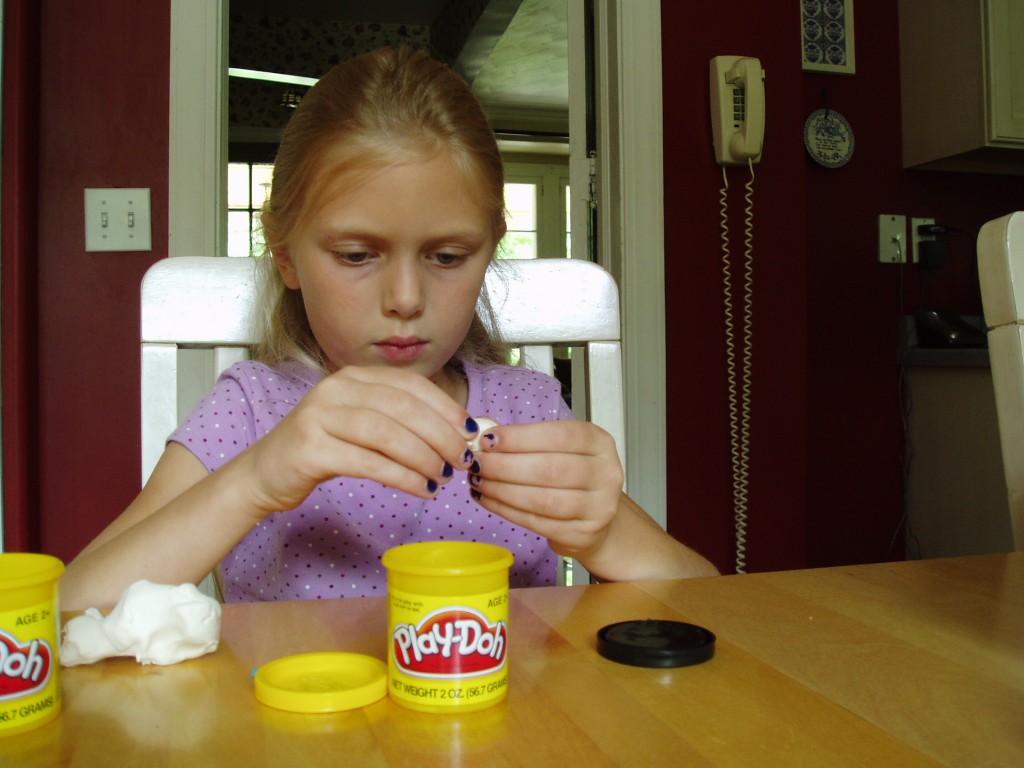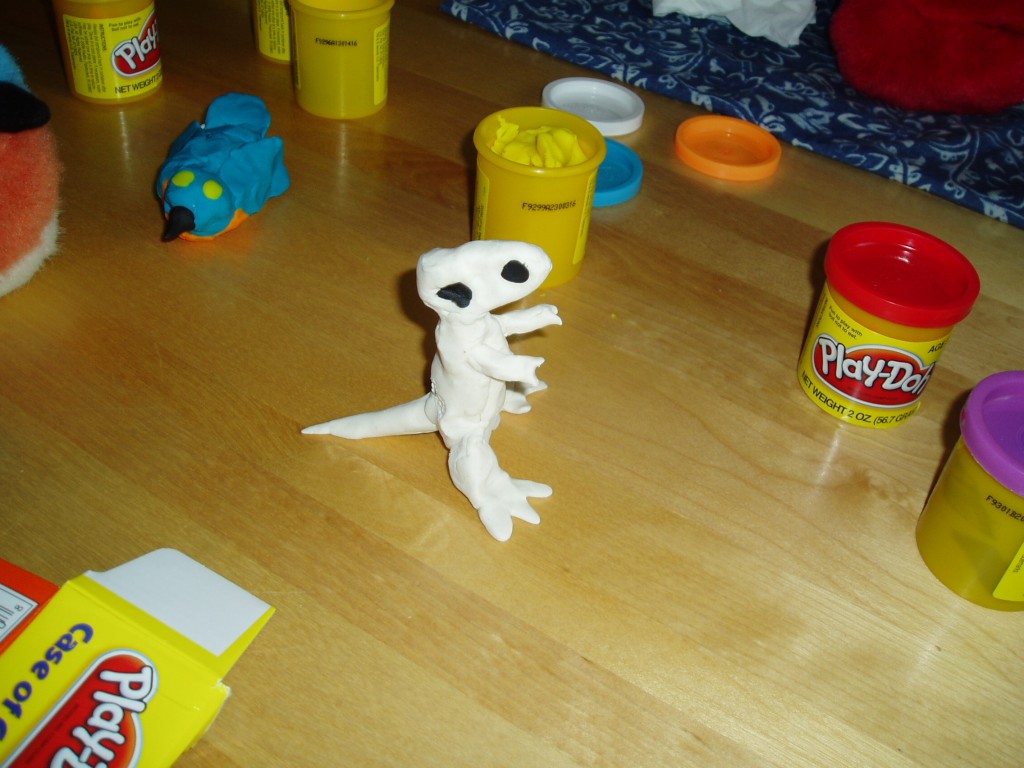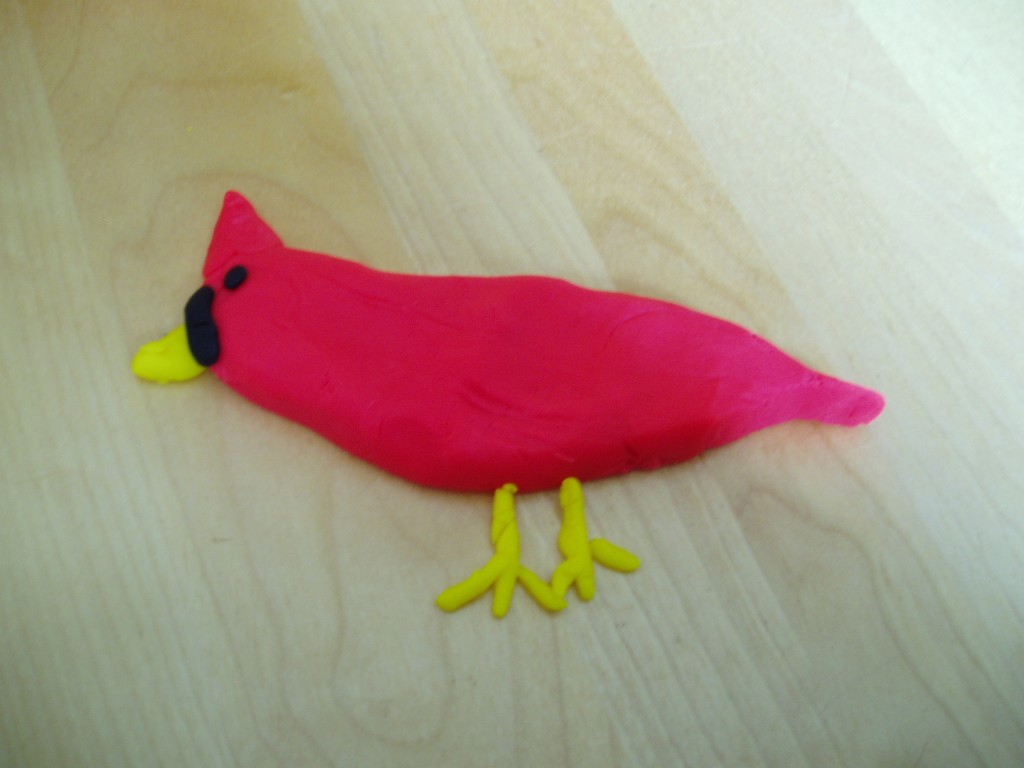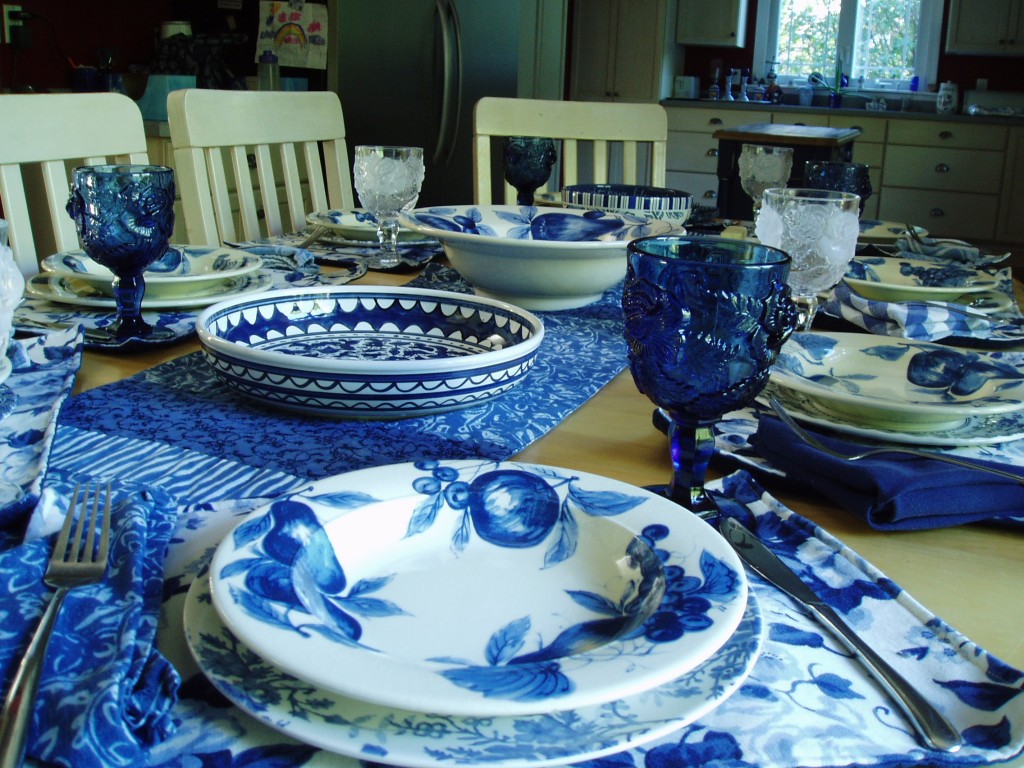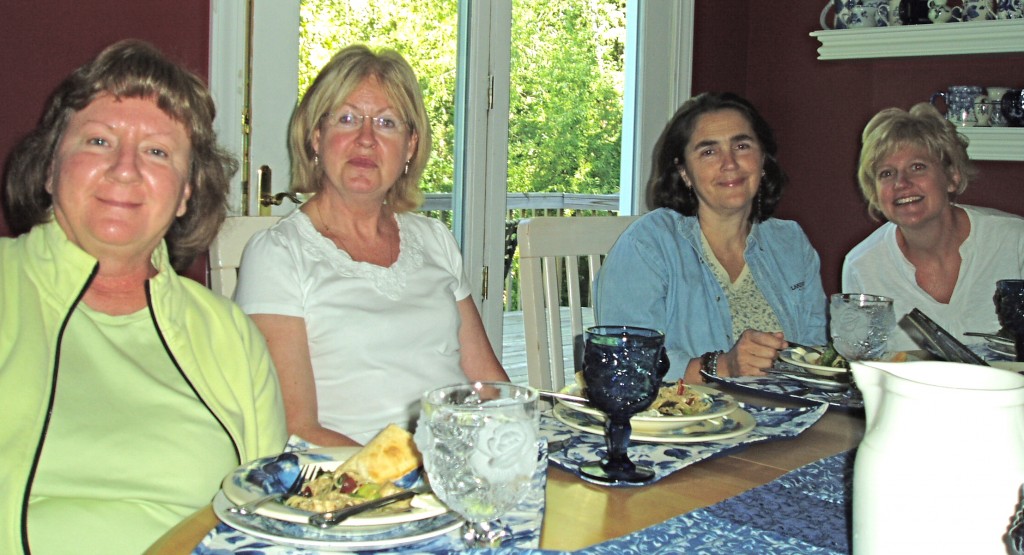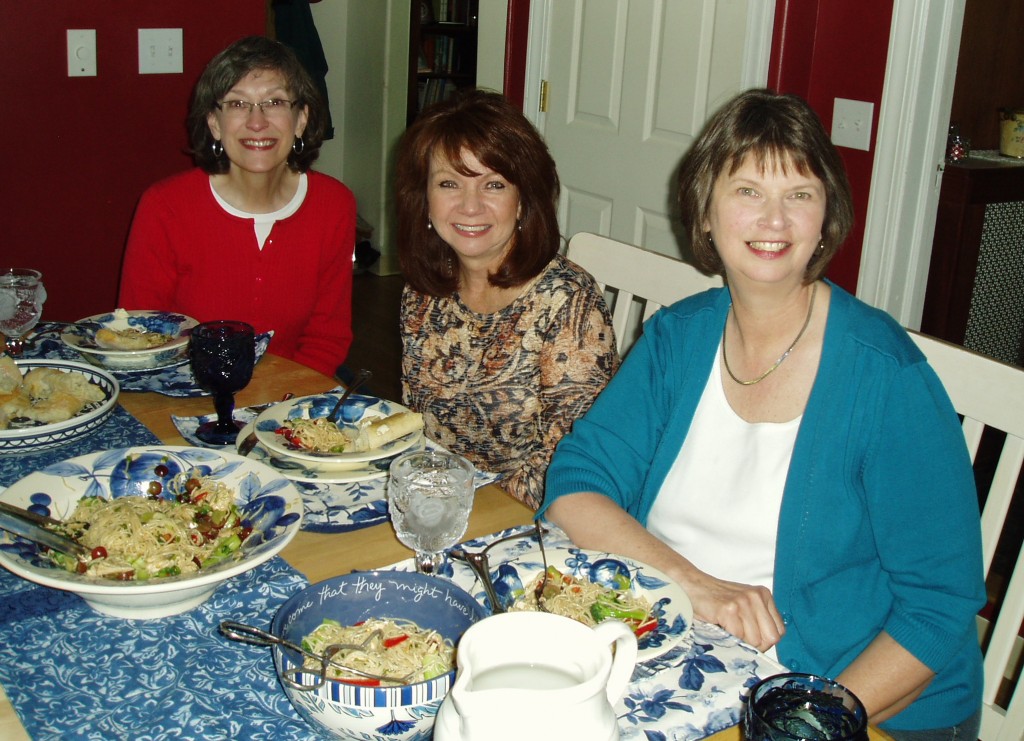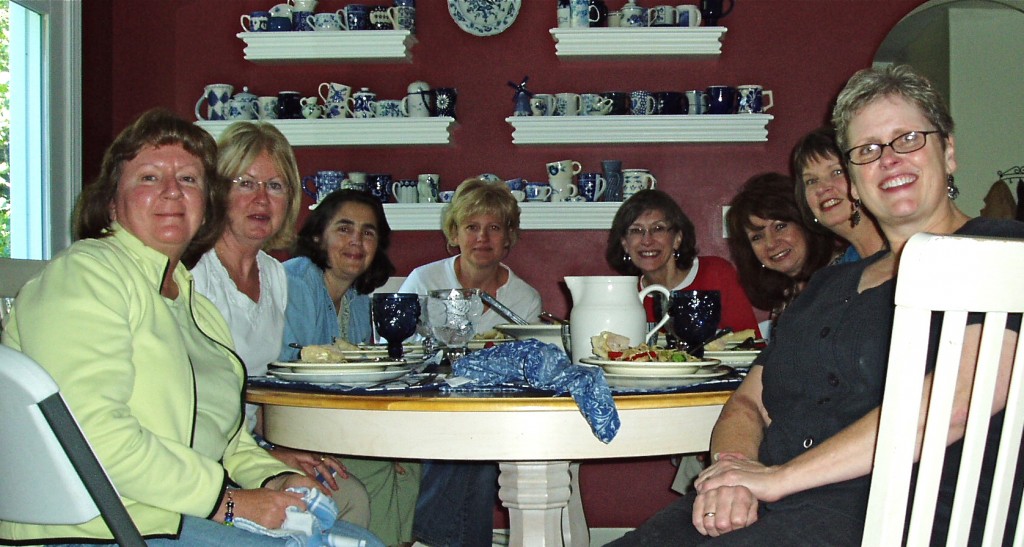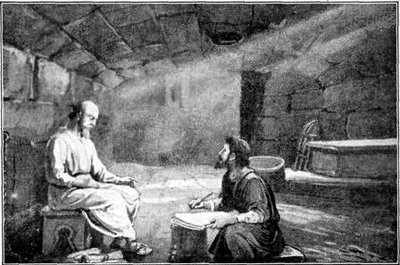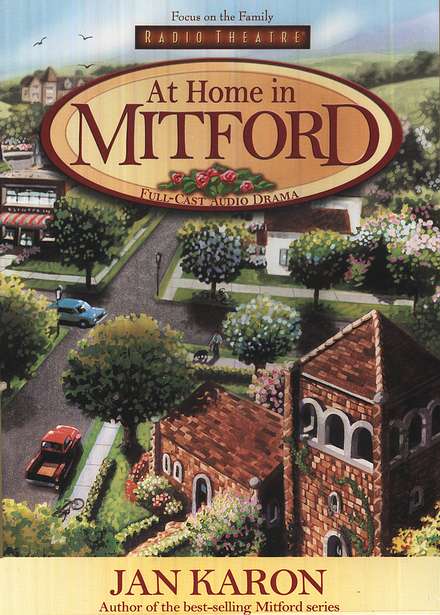I’m sure glad I don’t have a fish on my car
September 13, 2010 | My Jottings
Well, well, well.
Isn’t it interesting that after a wonderful four days away with friends and family, at a beautiful and peaceful resort on a clear and sandy lake, that something would happen to remind me that human nature is still corrupt and sinful, and in dire need of rescue. To clarify, that would be my human nature I’m talking about today.
I will write later (and post photos) about our fantastic getaway into Paul Bunyan country, and the lavish gift it was to me. I had my family around me, there was laughter and games and kayaking, there were children’s giggles and s’mores and a night sky so clear we could see the milkiness of the Milky Way. There was sleeping in until 7:30 a.m. There was good food and memorable sharing, and I was happy and grateful.
Then today when we returned to real life, which is also a very blessed and wonderful real life, I was glad I didn’t have a fish on my car.
You know the little chrome-like emblems that some Christians put on their cars to quietly say to those who would understand: “I believe. I am a follower of Jesus.”
 Like this one. I used to have one of these on our vehicle. I am not ashamed of identifying myself as one who has given my life to Jesus Christ. But I am chagrined at how I sometimes represent Him. Oh, to be that serene, optimistic, loving woman of fervent, effective prayer and unwavering faith! Ha.
Like this one. I used to have one of these on our vehicle. I am not ashamed of identifying myself as one who has given my life to Jesus Christ. But I am chagrined at how I sometimes represent Him. Oh, to be that serene, optimistic, loving woman of fervent, effective prayer and unwavering faith! Ha.
Yes, today I am saying ha. It’s not a sarcastic ha. It’s a don’t-forget-what-can-happen-when-the-dragon-of-selfishness-rears-her-ugly-head kind of ha.
After we returned from our fall vacation, Michael and I had to pick up prescriptions for several folks, replenish our groceries, and pick our dogs up from the dog hotel. I sat in the car while he went into the drug store to get the meds. “Be sure to get all four — Smith, Jones, McGillicutty and Johnson,” I reminded him as he walked into the busy place we frequent at least once a week.
As if he didn’t know the names. Of course he knows the names. I knew there was really no need to tell him the four last names of the people we were picking up prescriptions for, but since Parkinson’s hasn’t been very kind to Michael, sometimes reminders or reiteration is helpful to him. I sat waiting for him and people-watched. I had the windows down in the car and said a thank you for the invigorating fall weather we’re having — a brilliant blue sky, crisp air, light breezes, golden sunshine. And we are blessed enough (although I have no idea why) to be able to take a little trip with our family and friends!
After a much longer wait than would usually be expected, I saw Michael come out of the building and walk toward the car. With only one bag in his hand. A bag not large enough for four people’s prescriptions. When he got in the car I asked him where the other three bags were and he wasn’t really able to tell me. Parkinson’s sometimes causes speech difficulties. He did answer me, but I wasn’t able to glean from him why he only had McGillicutty’s meds and he didn’t get anything for Smith, Jones and Johnson. I knew the meds were ready; we had gotten confirming e-mails and recorded telephone messages from the pharmacy. I looked through the bag and again asked him why he didn’t get Smith’s, Jones’s and Johnson’s prescriptions when he knew we needed them all, and minutes before I had reminded him that we needed them all. He said something about the meds not being ready and that the gal behind the counter was new.
So?
By this time I was getting frustrated. We needed meds for Smith, Jones, McGillicutty and Johnson and all we had was McGillicutty’s. So I sighed loudly to make sure Michael knew I was tired and so put out. I knew what had probably happened — he hadn’t been able to make himself understood to the clerk. I asked if he thought that’s what happened and he wasn’t sure. Then I said a couple of things that I wish I had not said. And I said them loudly enough so that the older man sitting in the car next to ours with his window open, could certainly hear. Then I got out of the car, walked quickly into the drug store, obtained the prescriptions for Smith, Jones and Johnson with no trouble at all, and returned to the car. The man in the car next to us was still sitting there. He probably watched me go into the drug store and come out still miffed, and felt sorry for Michael.
As we drove away, both of us not saying much, I was glad I didn’t have a fish on my car. Not because I’m ashamed of letting others know I’m a Christian. No! Never!
But because I’m ashamed that when people all around me need a clearer picture of Jesus, sometimes all they get is me.
If you only read one thing today…
September 10, 2010 | My Jottings
Michael and I have sponsored some children through Compassion International for a long time now. We have often wondered if we would ever be able to take one of the Compassion sponsored trips to Uganda or Nicaragua or India to meet the children we help….or I should say Michael has wondered if we would ever travel to any of those countries. I haven’t been as anxious to go as he is, but I believe in the mission and the integrity of the organization and am open to God changing my mind about this someday.
We do so very little to help — we send less money per month to each child than it would take to have pizzas delivered to our door. Yet the letters we’ve received from our children and their families have always made us cry.
One year with the birthday money we sent to beautiful Najemba Violet in Uganda, her mother was able to buy a goat. The goat enabled them to sell a little milk, make some cheese, and that small difference helped Najemba go to school for a longer period of time, something she had wanted very much.
With the small amount of birthday money we sent to lovely Sanjana Ajitha in India, her family was able to put a new corrugated metal roof on their house, which is really a shack. They were so grateful and wrote back right away to tell us so. And they always ask us to pray that Sanjana’s daddy will return to the family someday.
The birthday money we sent to little Bayardo in Nicaragua bought a new (used) bed for him, and his mother sent us a photograph of her boy sitting on his new bed with a shy smile on his face.
I don’t share this because I’m so proud we send a small amount of money to some children in need. I actually feel rather ashamed, because we live in such abundance and what little we send each month makes me feel a tad less guilty about the plenty we have. That’s a little sick, I guess, but I’m just being honest. I actually think we should be doing more than we are. But we all know about that infamous road paved with good intentions…
Anyway, I have often looked forward to reading what various bloggers write about regarding their trips to meet the child/ren they sponsor through Compassion International, and today I was moved to tears by one woman’s account of meeting the little girl she has helped support.
If you only read one more thing today, please read this blog post by Ann Voskamp……..
I hope you sit back and read all of it.
I am going to read it again.
And again.
Taking a poll on Edith
September 7, 2010 | My Jottings
Please cast your vote and help us decide on something of profound importance! First, here are the details that may aid you in voting:
Anyone who reads this blog regularly knows that Michael and I have two Miniature German Schnauzers named Edith and Mildred. If you are interested in knowing how different they are from one another, click here for the details.
Our oldest Schnauzer, Edith, is pretty intelligent and a bit quirky. She can see herself in the mirror, and always thinks it’s another dog. She barks, whines and paws, and tries to get to the other dog so they can play together. She’s perplexed why the other dog doesn’t come into the room to join her, but instead just mimics everything Edith does. She gets frustrated with this.
Edith can also see herself in our oven door, and thinks another dog that looks just like her lives in the oven. No matter how hard she tries to make contact with the other Schnauzer, it never works. Poor Edith.
Edith thinks the other dog in the mirror/oven door/fireplace glass/French door is named Piggeth, and even if we barely whisper that name…”Piiiigetttthhhh?”…Edith springs up from her nap or whatever else she was doing and frantically looks in any mirror or the oven door to see if Piggeth is there. Piggeth (Edith’s evil twin) is always there, but Piggeth is not always accessible. Poor Edith.
Edith also loves to watch television. She has an attention span longer than a fifth-grader. If a show is interesting to her, Edith will sit alertly and quietly in front of the television in our den, watching intently for sometimes thirty minutes, slightly tilting her head as the scenes change, and waiting. Waiting for any sign of animal life.
If any animal appears on the TV, Edith immediately jumps to the screen and puts her nose against it so she can inspect the animal at close range. Consequently, we have to clean dog snot off our television screen more often than the average American family.
If Edith spots an animal of the four-legged variety on TV, she jumps as high as her two little hind Schnauzer legs will propel her, up and down, up and down, like a canine pogo stick, while snorting and trying to get at the four-legged animal she sees on the screen.
Did I mention Edith has a deviated septum? She makes loud noises when she breathes and she snores when she sleeps. When she thinks Piggeth has come to the oven door to say hello, or especially when she sees four-legged animals on TV, Edith jumps and snorts and gets so worked up we have to pull her away from the screen and 1) hold her on our laps to prevent her from engaging in this behavior for close to an hour, or 2) change the channel so no animals can be seen, and only then Edith will reluctantly go to the couch and lay back down. But she keeps her beady little brown eyes on the screen, and those silver schnauzery eyebrows twitch as she waits for the next beast to appear.
Edith also loves The Traveling Wilburys. Have you ever heard of them? They were a short-lived group composed of George Harrison, Bob Dylan, Jeff Lynne, Tom Petty and Roy Orbison. Long ago Edith heard their song “End of the Line” and started reacting to it, running around the house and acting very excited. We showed her the online music video on the computer, and she did the same thing at the computer desk that she does to the TV: jumped up and down and tried to connect with what she saw. Only this time it wasn’t with an animal – it was with the Traveling Wilburys. To this day if she hears that song she runs for the office and tries to see George and Bob and Tom up close. Not until the song is over does Edith return to her normal self and go lay down.
I took a few photos of Edith in action last night.
Here’s where the poll comes in. Edith is eight years old and has been doing this her whole canine life. We think it’s amusing and are used to it. Sometimes we laugh, sometimes we get annoyed and scold, “Edith! Go lay down! It’s just a hyena!”
But whenever we’ve had company and they happen to see Edith’s antics, everyone always says, “You should send a video of Edith doing this to America’s Funniest Home Videos!” We always smile and agree, knowing we never will. For one thing we don’t have a video camera, for another thing it’s just our little Edith watching television. Or watching Piggeth in the oven door. Or in the mirror. Or in the fireplace. This is just normal Edith behavior to us.
What do you think? Is it goofy enough to ask a friend to take a few minutes of video of Edith trying to make contact with Piggeth or a giraffe or The Traveling Wilburys, and then send it off to AFV? Or is it just something we should endure enjoy by ourselves and let it go at that?
Please help us decide! You can say yes or no by leaving a comment to this post. We will take the advice of my wise blog readers and let you know what the results are.
Thank you, my friends!
Better what you can
September 4, 2010 | My Jottings
Not long ago an encouraging reader named Shelley told me about an online site called The Rabbit Room. I have enjoyed visiting there but there’s so much to read and several contributors, and I haven’t plumbed the site yet. Two things I learned about at The Rabbit Room that I’ve absolutely loved — The Book of the Dun Cow by Walter Wangerin, Jr., and the music of Andrew Peterson.
I have a few CDs by Andrew now and am slowly listening to them and getting to know the music, none of which has disappointed me. He’s the one who does the amazing song I put on my blog recently — if you missed it click here. I get teary when I see the couples dancing and smiling at each other with the deep knowing that only long-marrieds seem to have.
Anyway, I read something that Andrew wrote and thought it was quite inspiring, so I’m going to quote it here so you can read it too:
“I know full well there’s sex-trafficking, slave trade, genocide, war, and starvation all over this broken, beautiful planet. The Kingdom, God’s will done on earth, stabs into the wide blackness like a bright sword in the hands of missionaries, doctors, pastors, and Christians who die for love every day.
Michael Card told me there’s more persecution in the church now than ever before. There are brothers and sisters in dank prisons right now. I don’t know why the Lord tarries. But until he comes, it is my job, in the words of George MacDonald, “to better what I can.”
Look around you. See the sorrow and weariness in the world, in your own community and church, under your own roof – in your own heart, for Heaven’s sake – and better what you can. Let Christ lead you; he’ll show you how.
If you’re wealthy, keep your job and fling the money at those who are bringing water to the thirsty. If you’re not wealthy, better what you can. Work your field. Tend your family like a garden. Write a song about your story. Write a story. Better yet, live a story. Make something beautiful, and make something beautiful of your life.
There’s so much in the world that’s falling apart, so put something together. Find a way.”
Andrew Peterson
* * * * * * * * * * *
Sometimes life seems so overwhelming, and I get bogged down with the helpless feeling that all the piddly little things I’m doing really make no difference at all.
Then I read what Andrew Peterson said and decided that for today I’m not going to think like that. It may not be much, but I’m going to better what I can. And if I mess up today, maybe with God’s help, tomorrow I will better what I can.
Hoping someone is with me on this,
Sculpting with Clara
September 1, 2010 | My Jottings
A while back when I realized that my sense of smell was gradually returning, I started compulsively putting items to my nose and inhaling deeply. Being 100% anosmic for several months reminded me of how much I take for granted. Can you smell a flower? Gently touch a grain of sand and feel it beneath your finger? Pee without assistance? See color? Brush your own teeth? Kiss a loved one? Drink freely of cold, clean water? If you can, you have some major joys to thank God for today.
A couple of years ago when I lost my sense of smell from a sinus infection and was told by an ear, nose and throat surgeon that it would most certainly never return, I was bummed. No matter how pungent something was, I could put it right to my nose and still couldn’t smell it. Everything was different then. Water didn’t taste the same, I was always asking people if my house smelled funky, I constantly tried to smell flowers even though I knew I couldn’t, and I kept asking God to restore my sense of smell.
After almost a year of having no olfactory capacity, I was thrilled when I began to faintly perceive scents again. I still can’t smell things like I used to, but if I had to guess I’d say about 30-40% of my sense of smell has been restored to me. Yay! I can smell things that are very fragrant if I put them close enough to my nose. I can’t smell things if they’re just a mild odor in the air. So if your house smells like it needs a good cleaning, you can still have me over and I won’t know it.
When I realized that there were some things I could smell again, of course I went around holding things to my nose and inhaling, thanking God for fragrance and the ability to enjoy it. One of the things I smelled was the old cannisters of Play-Doh I had kept for years for our grandchildren. The Play-doh did not smell good. It was too old and probably had a zagrillion teeming bacteria in each lump from years of little hands playing with it. So I tossed the old Play-Doh and bought some new. And I took the colorful lids off and put the new blobs of Play-Doh to my nose and deeply inhaled…aaaaahhhh…that old familiar smell was faint, but just the same as I remember from when I was young. Isn’t it funny how smells are so tied to our memories? I love how our brains work. Most of the time.
So eight-year old Clara came over to spend some time with Grandma recently and I pulled out the new, cleaner smelling and less germy Play-Doh. I sat at the table with her and we chatted as she sculpted.
Clara has gotten a few of her permanent teeth in and she’s looking older each time I see her. She’s such a beautiful blend of her mama and her daddy.
Here’s one of Clara’s creations that I had to zip my lips about. I hate snakes or any representation of snakes. But who doesn’t roll out a length of Play-Doh to make a snake when they start to play? So I told Clara what a nice job she had done on the snake and then cheerily suggested that she make something else.
Clara decided to make a copy of a little stuffed Eastern Bluebird we have named Eddy. If you squeeze Eddy’s tummy he sings a real recording of an Eastern Bluebird.
Here’s Play-Doh Eddy next to the real singing Eddy:
When I asked Clara what she was going to make next she said casually, “I think I’ll make a skeleton of a Tyrannosaurus Rex.”
So she did.
Clara asked me if I would like to make something out of Play-Doh with her, and of course I jumped at the chance. I considered making a bust of Winston Churchill or a galloping wild pony on the shores of Chincoteague with the ocean wind lifting its mane and tail, but decided on something more meaningful, more evocative of what life is all about for me.
If you don’t know the story you can read about it by clicking here. The names and dates have been changed to protect the innocent, but it’s a true story.
Today I’m so thankful I can smell Play-Doh. And watch my grandchildren play. And experience their love. And that there’s a cool breeze blowing in my office window right now, instead of the hot, humid air that has been hanging around for so long.
What are you thankful for today?
Anticipation
August 30, 2010 | My Jottings
Webster’s online dictionary gives this as one of its definitions for the word anticipation:
“the act of looking forward; especially: pleasurable expectation.”
Every summer for the past nine years, I have regarded Tuesday mornings with an “act of looking forward, with a pleasurable expectation” of what would take place in my home.
I have been blessed to have a delightful group of women grace my home each week for nine summers in a row. I joyfully anticipate their arrival and their presence. I anticipate their hugs, their words, their prayers, their smiles, their friendship.
In anticipation of my friends arriving each Tuesday morning at 8:45, I try to prepare our house to receive them. Our den is where the television is (which is needed for our Bible study DVD), and it’s a small room, so I bring in a few folding chairs to provide enough seating for nine.
When our study ended in mid-August this year, I prepared a simple luncheon in anticipation of some final time together around the table, enjoying each others’ company, breaking bread together, and talking about what we learned (and hope to apply) from our eleven week study.
In anticipation, I set the table in my mismatched blue and white plates and napkins and bowls and glasses. You can’t tell from the photos very well that underneath the bowls, each plate is different. They’re all blue and white, but some are old and were gifts, some are chipped and have been part of our family’s dining for thirty years, some are English and purchased off of ebay, some are trendy and nicely painted and more pleasing to the eye. Sort of like people. At first glance this table may look fairly uniform – it’s all blue and white. But if you had been there and could have closely observed, you would have seen that there was a lot of variety and each piece has its own history.
There are pieces are from Israel, some from The Madonna Inn in San Luis Obispo, California, some were gifts from my mother, some came from Holland, some from estate sales, some handmade items were from an old friend I haven’t seen in years. I like how they all go together, but aren’t the same at all.
It’s how we all are. If we can find a way to serve side by side and enjoy how we’re made and the unique and individual beauty we each bring to the table, a feast is there for the taking.
Above, from left: Sharla, Fiona, Lorna and Kay.
Above, from left: Laurel, Lana and Sue. Deb wasn’t able to be with us for our last gathering and she was dearly missed. 🙁
Grocery shopping was done in anticipation of my friends sitting at my table for a meal. The firmest grapes were purchased, as was the only brand I like of seasoned rice vinegar. Ginger and some of my favorite French loaves were picked. The chicken was poached in simmering water with some cider vinegar added to it, the fresh basil was coarse-chopped, the red bell peppers julienned, the broccoli blanched for one minute, and I finely minced the garlic as I pictured the fellowship around the table.
We had simple but flavorful fare — Spicy Grape Pasta Salad with Basil and Ginger, torn pieces of hot French bread and butter, and a dense dark chocolate cake with my mother’s peanut butter and chocolate frosting for dessert.
In anticipation of these beautiful women being in my home, I prayed and asked Jesus to join us here, to grace us with His presence, help and direction as we studied Isaiah and put our minds on Him. I asked Him to help us all live out the message of our study and to break free from the things that keep us from all He has planned for us.
In anticipation of next summer, I ask the Lord what He would have us study next year. I will try to listen well, and choose the one that will again have us all sitting at His feet, humbly asking for His touch and strength.
Lord, will you bless Sharla, Fiona, Lorna, Kay, Laurel, Lana, Sue, Deb and me today? Give us whatever we need to love you more, to trust you more fully, and to walk with you more closely. Thank you for the privilege of reading your Word, of gathering together in your name in freedom, and of the bounty you place on our tables. Touch each woman today in your own special way, Jesus. In your name I ask this, Amen.
In Search of Freedom
August 27, 2010 | My Jottings
Warning: this is a longish post.
* * * * * * * * * *
“What’s in a name?”
Shakespeare’s Juliet asked that question, implying that a person’s name should not be of enough importance to determine their destiny. In ancient times, there was great significance in a person’s name. Children were often named according to what their parents hoped they would be. Their names represented their destinies. Or they were named according to where the family was geographically located when the birth occurred, or according to what was going on in their lives at the time. If I had named my girls like this, their names would have been Yarnista, Germany and Honeymoon. In our culture we usually just choose names we like that sound good with our last names. We do look at the meanings of the names we give our children, but often what a name means is secondary in importance to how it sounds to us.
Have you ever read Philemon? In the short book of Philemon in the Bible, I have learned that Onesimus the slave had a name with a very significant meaning. His story is all tied up in his name.
There are only 335 words in the original Greek text to the book of Philemon, but it’s a wonderfully rich book. The issues of physical and/or spiritual freedom are threaded all throughout. Forgiveness is another strong theme in this little book, and the implication of the “what’s in a name?” theme is worth looking at as well.
I. Greetings from a prisoner — Philemon 1:1-3
“Paul, a prisoner of Christ Jesus, and Timothy our brother, to Philemon our dear friend and fellow worker, to Apphia our sister, to Archippus our fellow soldier and to the church that meets in your home. Grace to you and peace from God our Father and the Lord Jesus Christ.”
Did you notice that Paul didn’t say in essence, “Dear Philemon, this is Paul here, a prisoner of Rome.” He said, “I’m a prisoner of Jesus Christ,” which shows that Paul completely trusted every single thing that happened in his life to be from the hand of God. If he was in chains, it’s because God allowed it, or even decreed it. Paul wrote this letter somewhere around 60-61 A.D., and this was his first imprisonment. This was not the second and last time he was a prisoner of Rome, when Paul knew his execution was near. This incarceration was called house arrest, and Paul was waiting for his court appearance because he had appealed to Caesar. He lived in a small house for two years, and he was able to receive visitors. In Philippians 1:12 Paul tells us that his chains actually advanced the gospel. We don’t know if he was chained to the wall or to the floor, or chained to a Roman guard.
Paul had served and loved the Lord for so long, was so completely swallowed up in living God’s will, he didn’t miss an opportunity to speak fervently to anyone about meeting and knowing Jesus. It’s doubtful that any person could have spent any time at all with Paul and not have been deeply touched by the Spirit of the Lord. In fact, II Corinthians 3:17 says, “…where the Spirit of the Lord is, there is freedom.” So even though Paul didn’t have his physical liberty, I believe by that time he was one of the freest men to ever live. And anyone who spent any amount of time with him would have sensed and envied that freedom. Including his captors.
So this letter is addressed to Philemon, Apphia, who may have been Philemon’s wife, and Archippus, who might have been their son. Philemon and his family were wealthy Asiatic gentiles who lived in Colassae, and as most people of worth did in that area and era, they owned slaves. The letter from Paul to Philemon was probably “mailed” at the same time as the letter to the Ephesians and the one to the Colossians. Tychicus was the postman and Onesimus accompanied him after spending a very momentous time in his life with Paul the apostle.
Paul had most likely met Philemon in Ephesus, which was about 100 miles from Colassae, and Paul led Philemon to a saving faith in the Lord Jesus while there.
For the first three centuries after the death and resurrection of Christ, the church met in different homes, and one of the fellowships in Colossae met in Philemon’s spacious home. The main reason why Christians met in homes was because of the persecution factor at this time. They had to meet in secret. Their lives were often at risk as they followed Jesus. They may have had to sing and worship in whispers.
In the last verse of this greeting, Paul expresses to Philemon and to the others who will read this letter(that’s us), what he wants for them most, and he says, “Grace to you and peace from God our Father and the Lord Jesus Christ.” He has expressed this to recipients of his letters many times before. When Paul wrote to the Romans he said, “Grace and peace to you,” in his letters to the Corinthians he said “grace and peace to you,” to the Galatians, the Ephesians, the Philippians, the Colossians, the Thessalonians, he wanted them to have grace and peace from God the Father and Christ Jesus our Lord. He wished the same for Timothy and Titus, and here he was saying how much he wanted Philemon and any others who read that letter to have grace and peace.
Paul used words purposefully, so we can be sure that grace and peace are not just Paul’s way of saying, “God bless you all.” When Paul declares that grace and peace are what he wants people to have from God, there’s deep meaning there. Grace was always listed first in Paul’s greetings. He never said, “Peace and grace to you.” What difference does that make? Well, he knew better than almost anyone that peace doesn’t come without grace coming first. Grace, which means “unmerited favor” also carries the picture with it of God “stooping” or “bending low” to us in His great love. He did this by sending His son Jesus for us, to die in our place for our crimes against Him and humanity, and this is what grace is all about. So even in the order of his words, Paul is reminding us that we can’t have peace with God, or peace from God, unless we have first experienced the grace that God gave us through His Son. So it’s grace and then peace.
And Paul, though chained, beaten, starved, mocked, deserted and hated, knew God’s grace and peace well. He knew that there was nothing more important than accepting God’s grace through trusting His Son, and receiving that peace that passes all understanding. Grace and peace. I love it when we can find an entire volume of powerful truth in just one phrase in the Bible. We don’t always need to devour huge portions of the Bible to be instructed and fed, although there are appropriate times for taking in large amounts of scripture. Sometimes we need to allow the Holy Spirit to lead us to one verse, one phrase, and ask Him to illuminate that to us and what it means personally for our lives. And then ask the Lord to help us meditate on it all day long, all week long, ask Him to help us mine the riches that are hidden for those who will search. So one of the treasures from these three “little” verses is that peace does not come without grace. If we open our heart’s door to the grace of God through Jesus Christ, peace floods. That peace is available to us every day of our lives and is not contingent on whether or not we are going through trials and hardships.
II. Praises for a beloved friend — Philemon 1:4-7
In verses 4 through 7 we see Paul praising Philemon – he thanks God for the kind of man he is, and the love he has shown for people. Verses 4- 5 say “I always thank my God as I remember you in my prayers, because I hear about your faith in the Lord Jesus and your love for all the saints.” Paul must have had an incredible prayer list, because he was always praying for many people individually and for groups of people. But Philemon stood out in Paul’s mind as the kind of person who caused him to say “Oh thank you God!” each time he thought of him.
Do you have anyone in your life like that, someone who is so special and so loving that just the mere thought of them brings tears of thankfulness and an exuberant “Thank you God!” to your lips? I do. Her name is Dorothy.
Dorothy is my step-mother, and she and my dad were married for many years until he died in November of 2007, in San Luis Obispo, California. Dorothy lived her life to love my dad, and she blessed our family many times.
My parents suddenly divorced after 31 years of marriage when I was 14 years old. It was devastating to our family, but that is another story. Years later my father met and married Dorothy, whom I want to say, was not the cause of my parents’ divorce.
When my mother (who had remained unmarried) lost most of her vision and could no longer care for herself, my husband and I prepared to move her close to us in Minnesota. Her house in Morro Bay, California sold, and then she fell ill and required surgery and a lengthy hospital stay. Mom’s house was packed and then occupied by the new owners while she was still very sick in the hospital. She was too ill to move to Minnesota right away, so when she was released from the hospital she had no place to go. I considered flying to CA and renting a hotel room for a few weeks so I could care for her until she was able to move back here.
Right about this time, my dad’s wife Dorothy stepped in. She’s a committed Christian and reminds me of Philemon. Her personality is one of love, encouragement, humble servant-hood and grace. She announced to my mother (who barely knew Dorothy at the time, and wasn’t anxious to know Dorothy since she was my dad’s wife), to my dad and to our family, that my mom was coming to live with them and she would care for my mom.
“Oh, no I’m not,” my mom said.
“Thank you, Dorothy, but we can’t let you do that,” is what Michael and I said.
And what my dad said was “Oh. My. Gosh.”
Dorothy — gracious, meek, and not known for her forcefulness, insisted, and my mother, my father’s first wife, moved in with my father and his new wife. My mom couldn’t see well, couldn’t change the bandages from her surgery, had become incontinent and had to sit on towels that had to be laundered constantly, had lost her taste for most food and could only tolerate some things. Dorothy lovingly cared for my mother for weeks. She changed her bandages, washed what my mom called her pee towels, cooked the same things over and over for my mom, and did it in such a way that made my mom feel like it was the most wonderful thing that had ever happened in Dorothy’s life.
Dorothy’s love for my mother built the foundation for a Christian friendship that lasted until my mother’s death eight years later. They regularly talked on the phone, told each other they loved each other, and my mother grew in Christ because of Dorothy’s witness to her. Dorothy’s tender care for my mother softened my father’s and mother’s hearts for each other, and even though I don’t believe divorce was God’s will for them, they were friends from that point on. When my mother died eight years later, my father mourned. Dorothy’s love for my mom brought me to my knees in tears and gratitude, and to this day when I think of her or pray for her my first thoughts are “Oh thank you God! Dorothy has been such a gift from you to our family!”
In verse 6 Paul told Philemon that his prayer for him was that he would be active in sharing his faith, so that he would have a full understanding of every good thing he had in Christ. There is something about saying out loud what Jesus has done for us that opens our eyes to understanding even more of the mercies He’s given. Verse 6 implies that when we share our faith, our eyes are opened to the other things God has done for us aside from giving us salvation, as if that wasn’t enough. When we share our faith, we may not feel totally equipped to speak knowledgeably about many of the things skeptics ask, but we can always share what Jesus has done for us. We can say “This is what my life was like before Him; this is what my life is like now.” That is sharing your faith.
Paul continues in verse 7 – “Your love has given me great joy and encouragement, because you, brother, have refreshed the hearts of the saints.” This word refreshed means “to give rest to.” Dorothy will always be one of my greatest examples of someone who has refreshed, or given rest to, other believers. This might be a good time to pause and ask ourselves, “Do I drain people, or do I refresh them?” I know what I want to do.
So Philemon had an outstanding reputation. He was known throughout the scattered church of Jesus Christ as a man of love, a man who generously gave of his time and belongings to others, and a man who was compassionate and helpful. His character was strong and noble.
III. An appeal for a new man Philemon 1:8-11
But the Philemons and Dorothys of this world aren’t immune to sin just because they do so much good. Paul knew this, so he broached a potentially unpleasant subject to Philemon. In verses 8-11, Paul gets to the thrust of this letter, and that was to talk to Philemon about his runaway slave, Onesimus. Now, slaves were the machines of their day. It is estimated that there were about 60,000,000 slaves in the Roman Empire, out of a total population of 120,000,000. (Thankfully, slavery is now seen as the horror it really is, but it was quite the norm for the Roman Empire.)
Paul says to Philemon in verses 8 and 9, “Therefore, although in Christ I could be bold and order you to do what you ought to do, yet I appeal to you on the basis of love.” Paul was an apostle, a sent one with great authority. On the road to Damascus when he was still a Christian-hater, he had literally met Jesus Christ in His fully resurrected state. Paul had been apprehended, corrected and commissioned by Christ and the course of his life changed forever. He could have authoritatively told Philemon to welcome Onesimus back into his home, to forgive him and restore him, but instead he tactfully appeals to Philemon on the basis of love.
Do you know what I thought of here? I thought about Paul’s conflict with Mark years earlier. Early on Paul had a strong, arrogant, personality. When he was knocked to the ground and temporarily blinded by Jesus Christ, some of those traits may have been tempered. But not all of them. It took years of walking with the Lord and doing His will to completely soften Paul. He had no patience with Mark when he had deserted Paul and Barnabas and hadn’t continued with them in the work they were doing. The Bible says they had a sharp disagreement and parted company. This is Bible terminology for “Paul stomped off in a huff.” But 12 years later, after being imprisoned for two years and enduring almost unbearable hardship and untold blessing as an ambassador of Christ, Paul’s heart was soft and submitted to his Lord. It’s good to think that Mark might have been Paul’s inspiration for seeking restoration between Philemon and Onesimus. The old Paul might have said “Philemon, do as I say!” The sanctified Paul appealed on the basis of love, which came from his own personal struggles. He had learned a more excellent way.
The second half of the book infers that very likely Onesimus also stole from Philemon. He was a household slave who would have known where things were kept, and when he decided to go in search of his freedom, he probably took money or other items of value in order to sustain himself for the weeks it took to reach Rome.
Philemon and his family had been wronged. They had much to forgive. If he was the loving man Paul says, he surely must have been a kind slave-owner. Onesimus was probably well-treated and provided for, yet we can see in his fleeing a picture of our own selves: we have been given life and provision and whatever we need from our generous God, our “owner,” yet often each one of us takes it all for granted and we wander away from Him, in search of the kind of freedom and things we think we need.
Many commentators said that in this book we can see Paul as a mediator, obtaining mercy and restoration as Jesus does for us. That we can see in Philemon a picture of God – wealthy, gracious, loving, yet misunderstood and wronged. And in Onesimus we can see a picture of ourselves, always thinking that freedom is on the other side of the hill, thinking that what will fulfill us is something which can be possessed, instead of something that happens in our hearts. In him we see our own sinful natures. Martin Luther said “We are all Onesimuses!” We have disregarded our Master’s kindness and selfishly go off in search of freedom, not realizing that true freedom is found in Him alone. I need to remember that where the Spirit of the Lord is, there is freedom. But Onesimus had not learned this truth yet.
And Philemon could have slipped easily into his own form of slavery had he not been willing to forgive. If we don’t forgive, we open the door to all sorts of evil, and hinder fellowship with the Lord. Paul the Persecutor became Paul the GreatHeart by the transforming power of God, evidenced by these words he wrote to us and the Ephesians around the same time as his letter to Philemon: “Be kind and compassionate to one another, forgiving each other, just as in Christ God forgave you.” Time does not heal bitterness and resentment. Sometimes we are hurt so deeply that the work of forgiveness has to be done over and over again, but we must keep at it or we will be slaves to the cruelest kind of master.
In verse 9 Paul also mentioned again that he was a prisoner, not of Rome, but of Jesus Christ, and that he was now an old man. He was probably about 60 years old at this time, in an age where the average life-expectancy for a man was about forty-five. As we know, Paul had been shipwrecked, beaten and left for dead, had probably experienced many broken bones and serious head injuries, had been malnourished. The toll his life had taken on his body must have made him seem even older than his sixty years. He was weary in body, but buoyed up in spirit, because there in that place of imprisonment, there with the clanking chains around his ankles, the Spirit of the Lord was present. So there was liberty.
What were the odds that Onesimus would flee from the household of Philemon in Colassae, travel over 1000 miles on land and sea to Rome, a city of approximately one million people, and find Paul there among the masses? It could have been that Onesimus didn’t intend to run into Paul, or it could have been that the Holy Spirit was working on Onesimus the entire time in his search for freedom, and by the time he reached Rome he set out to look for Paul. Onesimus may have heard Paul’s name mentioned in Philemon’s house or he may even have met Paul in Ephesus when he was there with Philemon. Whether or not he had ever met him, whether or not he was intentionally trying to find Paul, the Spirit of the Lord propelled Onesimus toward real freedom when he guided him to the place where Paul was chained and under house arrest.
Verse 10 says “I appeal to you for my son Onesimus, who became my son while I was in chains.” Paul only called three people sons: Titus, Timothy and Onesimus. We don’t know how much time Onesimus spent there with Paul, but it was sufficient time for him to see what real freedom looked like. Paul was in chains yet was truly free — his search for freedom ended on the road to Damascus. Onesimus’s search for freedom ended next to his spiritual father Paul, in a rented house in Rome. Once he realized that true freedom is a destination of the heart, he knew he had to go back and humbly ask forgiveness from Philemon and his family.
Let’s segue a bit and take a look at what Paul possessed while in chains, versus what Onesimus had, once he had supposedly secured his freedom. In just 11 verses, we can see that Paul’s chains didn’t hinder him from possessing grace and peace, gratitude, a magnificent prayer life, comfort, a few loyal friends who ministered to him, heartening news of God’s work in others, spiritual authority and boldness, powerful influence, humility, compassion, mercy, and concern for the lost. In chains, Paul knew encouragement from a friend’s love toward others, had a productive awareness of who he had been and who he was then, he had the ability to see promise in someone that others would have considered the dregs of society, he had the gift of relinquishment, love, and of course, the freedom found because the Spirit of the Lord was there with him. And Paul had the honor of being imprisoned for the King of the Universe.
Let’s take a look at what Onesimus had after he ran away in search of freedom: he may have had greater physical freedom, but what probably constituted Onesimus’s life on the run were loneliness, misery and guilt. Whatever pleasures he found after he left Colossae were short-lived.
The word slave in the Greek is doulos, which means one who is in servitude to another, his will being altogether consumed in the will of another. Paul called himself this kind of slave. His will was altogether consumed in the will of Jesus Christ, and in that state he found his freedom.
Onesimus eventually learned that staying in Rome or going back to service as a slave in Colassae had little to do with experiencing liberty. With Tychicus as his traveling companion and new brother in the faith, he returned to Colassae, holding tightly to the letter from Paul and praying that he would be forgiven.
Remember that crucifixions were common in the Roman Empire and it is almost certain that Onesimus had seen criminals executed this way. The common punishment for thieves in that day was death on a cross. Jesus died between two thieves. This may have well been uppermost in Onesimus’s mind – will I be forgiven or will I get what other thieves and runaway slaves get? We might be tempted to think that because of Paul’s description of Philemon’s love and glowing character, Onesimus’s restoration was a given, but if Paul had to write such a strong appeal, I don’t think we can know for sure. The Philemons and the Dorothys of this world are not perfect. They, like all of us, need reminders on how crucial it is for us to forgive.
The wrong that was done to Philemon, the property that was taken, may have been a huge amount that crippled the household financially. But in his appeal, Paul asked Philemon to be kind and compassionate to the repentant Onesimus, forgiving him; just as in Christ Jesus God had forgiven Philemon.
At the end of this short passage in Philemon, Paul says, “formerly Onesimus was useless to you, but now he has become useful both to you and to me.” Onesimus is the Greek word for “useful” or “profitable.” Obviously someone who steals and rebels is not useful. But this play on words beautifully implies that by coming to the Lord Jesus Christ, by bowing his knee and will to his real Master, Onesimus was finally true to his name. He became useful, profitable, not just to Paul, but would be to Philemon too.
So, what’s in a name? In Onesimus’s case, much.
What’s in your name? What does your name mean? I looked up a few. If your name is Kathy or a form of Kathy – like Carey or Kay, your name means pure one. If you are in Christ, you have been washed completely clean…He has restored your purity and He can make you true to your name.
Beatrice – your name means she who blesses. Before Christ you were under a curse, but in Him you bless others.
Susan? One who trusts. Your destiny in Him is to fear not, and trust Christ with reckless abandon.
Lois? Your name means famous. You may have been relatively unknown before you came to the Lord, but as you walk with Him and are transformed into His image, your reputation in Heaven will be legendary.
Phyllis? Your name means lady. I don’t know what characterized your life before Christ, but in Him you are clothed in strength and dignity.
Carol? Did you know your name means joyous? No matter what kind of sadness and mourning you’ve seen, in Jesus Christ you can still rejoice in His hope and promises.
Chris, Kristi or a form of Christine? Your name is rooted in one faith – faith in Jesus Christ, and you are His namesake.
My own name means youthful. As I watch my fingers bend in different directions and see my eyesight fade, I take comfort in the fact that in Him, age doesn’t matter. The slower and grayer I become, the closer I will get to being with the One I’ve waited for my entire life.
And can I tell you what the name Dorothy means? It means Gift of God.
Who can transform a person into the meaning of their name? Who could make “useless” Onesimus useful? Who can make a person a blessing who was once under the curse? Our Savior.
Who can make an impure, corrupt person pure? Jesus.
Who can make a mourner joyful? Jesus can.
Who can help a fearful one trust? Who can make the unrighteous righteous? Jesus Christ alone.
The search for freedom is a journey every human takes, and those who become slaves or prisoners of Jesus Christ are the ones who find liberty in the truest sense of the word.
When Onesimus came to faith in Christ, he gained the most important kind of freedom, and he became true to his name. When we come to faith in Christ, we are invited and enabled to walk in that same freedom no matter what our circumstances, and even if our given name doesn’t mean something beautiful, that name is written down in the Lamb’s Book of Life, which gives it the most beautiful meaning of all.
Edition 44-Wednesday’s Word
August 25, 2010 | My Jottings
Could we with ink the ocean fill,
And were the skies of parchment made,
Were every stalk on earth a quill,
And every man a scribe by trade;
To write the love of God above
Would drain the ocean dry;
Nor could the scroll contain the whole,
Though stretched from sky to sky.
From the hymn “The Love of God” by Frederick Lehman, 1917
* * * * * * * * *
Winner’s Choice!
August 24, 2010 | My Jottings
There were six people who left comments describing themselves using alliteration – their answers were fun to read!
I used random.org to pick a winner, and the number six came up, which means Christy is our winner. This time I’m doing something different with this giveaway. I’m going to let Christy choose one of two prizes for her winning, warm and waggish answers.
This set of CDs is a wonderfully done radio theatre drama of the book At Home in Mitford by Jan Karon. I have listened to this whole production several times myself (although this set is brand new and unopened) and it’s a thrill each time I hear it. If you’ve read the Mitford books, this will not disappoint.
It’s not a book on tape — it’s an acted-out production with music and phenomenal sound effects, and there are some famous people who lend their voices for the characters.
Michael and I have listened to this in the car and even though he hasn’t read the series, he enjoyed it too. The running time is six hours and 36 minutes.
Or Christy can choose a new copy of this book that I just finished:
The Book of the Dun Cow by Walter Wangerin, Jr. I had read two of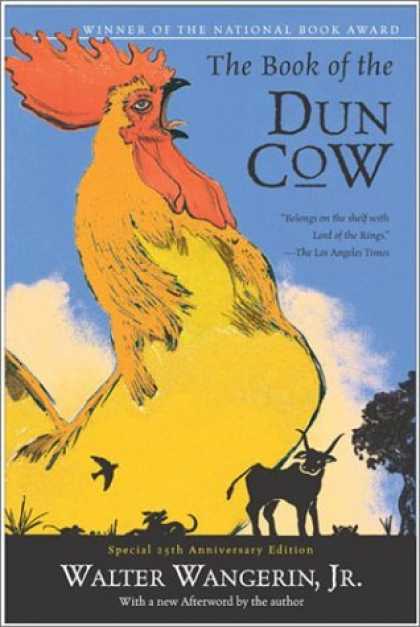 this author’s other books and enjoyed them (The Book of God and Paul), but I just recently heard about this one. If any of you have read this one I’d love to know what you thought.
this author’s other books and enjoyed them (The Book of God and Paul), but I just recently heard about this one. If any of you have read this one I’d love to know what you thought.
I don’t even know how to describe this book. I couldn’t put it down. I’ve never read anything like it. I was riveted. Stunned. Repulsed. Amazed. Engrossed. Moved. Enlightened. Encouraged.
So now it’s up to Christy to choose between the Mitford CD set, which is wonderful, or The Book of the Dun Cow, which is unforgettable in its own way.
Christy, please make your choice in the comment section and tell us what your choice is and why. Then I’ll mail it out to you right away!
Thank you all for leaving your alliterative descriptions!
Blessings,
Alliterative Analysis
August 20, 2010 | My Jottings
I like alliteration. You might find proof of that by looking just left of these words to see the titles of some of my recent blog posts. Most of you know that alliteration is the use of the same letter or sound at the beginning of adjacent or closely connected words. “The more the merrier” and “blind as a bat” are a couple of common alliterative phrases. “The fickle finger of fate made sure the dragonfly was dead as a doornail” is another alliterative example.
For some fun on the blog I’m going to ask you all to describe yourself in at least two words, preferably three, using alliteration. So you might say you are friendly and fearful. Or bubbly and brave and bold. Or lanky and lazy. Or intrepid, insecure and independent. Or mean, malevolent and menacing. Actually, if you are mean, malevolent and menacing, please read no further and just close this blog and quietly turn off your computer now. Thank you.
There might be a bloggy giveaway contest connected to this post. You won’t win anything if you don’t do a little fun alliterative analysis of yourself. You might win something if you do.
I’ll play along too, although I’m not eligible to win a prize. (How weird would that be to award myself my own prize? We have a winner for my blog’s bloggy giveaway, and it’s me! Thank you all for entering, but none of you won….I won! On the day something like that happens here, that will be your signal to start praying for me in earnest.)
Anyway, choose any letter you like to begin your words. I’m choosing the letter C to describe myself in three words (one slightly positive, one slightly negative, one fairly neutral):
Capable
Curious
Controlling
Can you guess which one is the slightly negative one? If not, you could call my husband Michael and he might be willing to help you figure it out. 🙂
When I was a little girl I think my parents, if they were giving their analysis, would have said I was:
Bookworm
Bossy
Bespectacled
Bony
*Sigh*
Now it’s your turn! What two or three (or four!) alliterative words would you use to describe yourself? Comments will be taken until Tuesday morning and the winner will be announced later that day.
Get going, you gracious and gifted guys and gals!
